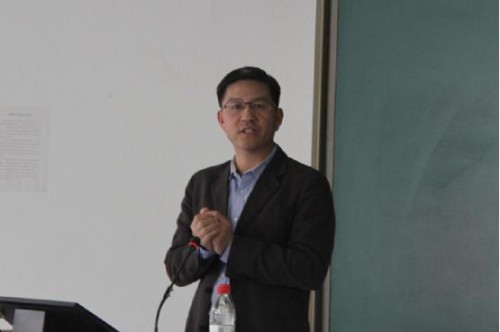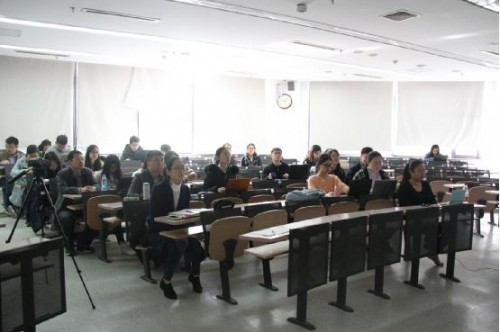Tao Xiang International Finance Lectures (No. 13): Internationalization of Chinese Banks and Financial Support for the Belt and Road Initiative
2018-04-04 IMI Zhang Weiwu first introduced the development of the internationalization of Chinese banks. He pointed out that multiple factors are behind the trend of banks' internationalization, such as supporting national strategies, responding to customer needs, and improving banks' competitiveness. The banks' global service network is continuing to improve, covering the world's major economies and other countries and regions that closely cooperate with China in economy and trade. In terms of economies of scale, the overseas assets of Chinese banks have grown steadily, but the proportion of their overseas profit in the total profit is still smaller than that of their international counterparts, such as Citibank and HSBC. In terms of development strategies, Chinese banks are fully supporting the Belt and Road Initiative, properly managing existing institutions and improving service capabilities. Meanwhile, they are also actively promoting the internationalization of RMB by developing financial infrastructure.
With regard to financial support for the Belt and Road Initiative, Zhang Weiwu pointed out that great opportunities and market with broad prospects lie ahead for Chinese banks. Meanwhile, however, financial support for the Belt and Road Initiative faces many risks besides the inherent risks of the commercial projects, such as regulatory and compliance risks, policy risks, and labor risks. The going global enterprises also face problems such as lacking experience, failing to observe customs and manner in specific religion and culture, and displaying a lack of awareness of risk prevention and compliance management. In some cases, they also have insufficient understanding of the countries along the routes, and pay insufficient attention to fulfilling social responsibilities. On that account, he put forward advices and shared ICBC's experience in the aspects including risk prevention, compliance with laws and regulations in internationalized operations, innovation-driven development, RMB internationalization and financial market opening. He also called for implementing cooperation mechanisms, actively voicing Chinese banks' opinions in the international financial market and enhancing pragmatic cooperation among Chinese financial agencies for mutual benefit. He also stressed and advised on compliance with commercial principles in realizing the sustainable business development along the Belt and Road, green development, and fulfilling corporate social responsibilities.
Zhang Weiwu first introduced the development of the internationalization of Chinese banks. He pointed out that multiple factors are behind the trend of banks' internationalization, such as supporting national strategies, responding to customer needs, and improving banks' competitiveness. The banks' global service network is continuing to improve, covering the world's major economies and other countries and regions that closely cooperate with China in economy and trade. In terms of economies of scale, the overseas assets of Chinese banks have grown steadily, but the proportion of their overseas profit in the total profit is still smaller than that of their international counterparts, such as Citibank and HSBC. In terms of development strategies, Chinese banks are fully supporting the Belt and Road Initiative, properly managing existing institutions and improving service capabilities. Meanwhile, they are also actively promoting the internationalization of RMB by developing financial infrastructure.
With regard to financial support for the Belt and Road Initiative, Zhang Weiwu pointed out that great opportunities and market with broad prospects lie ahead for Chinese banks. Meanwhile, however, financial support for the Belt and Road Initiative faces many risks besides the inherent risks of the commercial projects, such as regulatory and compliance risks, policy risks, and labor risks. The going global enterprises also face problems such as lacking experience, failing to observe customs and manner in specific religion and culture, and displaying a lack of awareness of risk prevention and compliance management. In some cases, they also have insufficient understanding of the countries along the routes, and pay insufficient attention to fulfilling social responsibilities. On that account, he put forward advices and shared ICBC's experience in the aspects including risk prevention, compliance with laws and regulations in internationalized operations, innovation-driven development, RMB internationalization and financial market opening. He also called for implementing cooperation mechanisms, actively voicing Chinese banks' opinions in the international financial market and enhancing pragmatic cooperation among Chinese financial agencies for mutual benefit. He also stressed and advised on compliance with commercial principles in realizing the sustainable business development along the Belt and Road, green development, and fulfilling corporate social responsibilities.
 In the Q&A session, Zhang Weiwu answered the students' questions about the market positioning of ICBC in Europe and Southeast Asia in the context of the increased supervision. Dr. He Xiaobo, senior trader from CNH trading center of Bank of China (Hong Kong) commented on this lecture. He considered Zhang's explanation on the international business of Chinese banks to be comprehensive. Dr. He also made a comparison of how BOC and ICBC set up institutions abroad. In the end, he pointed out that there would be huge demand for talents specialized in banking supervision and technology.
In the Q&A session, Zhang Weiwu answered the students' questions about the market positioning of ICBC in Europe and Southeast Asia in the context of the increased supervision. Dr. He Xiaobo, senior trader from CNH trading center of Bank of China (Hong Kong) commented on this lecture. He considered Zhang's explanation on the international business of Chinese banks to be comprehensive. Dr. He also made a comparison of how BOC and ICBC set up institutions abroad. In the end, he pointed out that there would be huge demand for talents specialized in banking supervision and technology.
